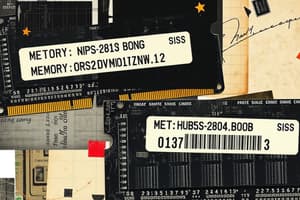Podcast
Questions and Answers
What is 256?
What is 256?
- 2 to the 8th power
- Number of different numbers in a byte
- Both A and B (correct)
- None of the above
What does AI stand for?
What does AI stand for?
Artificial Intelligence
What does ASCII stand for?
What does ASCII stand for?
American Standard Code for Information Interchange
What is the concept of abstraction in computer science?
What is the concept of abstraction in computer science?
What is meant by an 'address' in computing?
What is meant by an 'address' in computing?
What is agent-based modeling?
What is agent-based modeling?
What is an agent in computing?
What is an agent in computing?
What is an algorithm?
What is an algorithm?
What does 'analog' refer to?
What does 'analog' refer to?
What is an application in computer science?
What is an application in computer science?
What is 'artificial intelligence'?
What is 'artificial intelligence'?
What does 'autonomous' imply in computing?
What does 'autonomous' imply in computing?
What is bandwidth?
What is bandwidth?
What is 'big data'?
What is 'big data'?
What is the binary number system?
What is the binary number system?
What is a bit?
What is a bit?
What is a boot program?
What is a boot program?
What does 'boot' mean in computing?
What does 'boot' mean in computing?
What does 'broadcast' mean in messaging?
What does 'broadcast' mean in messaging?
What is a bus in computing?
What is a bus in computing?
What is a byte?
What is a byte?
What does CPU intensive mean?
What does CPU intensive mean?
What does CPU stand for?
What does CPU stand for?
What is cache in computing?
What is cache in computing?
What is a card in computing?
What is a card in computing?
What is the Central Processing Unit?
What is the Central Processing Unit?
Flashcards are hidden until you start studying
Study Notes
Computer Science Terms and Definitions
- 256: Represents 2 to the 8th power; the number of distinct numbers storable in a byte, ranging from 0 to 255.
- AI (Artificial Intelligence): The branch of computer science focusing on creating programs to perform tasks typically requiring human intelligence.
- ASCII: American Standard Code for Information Interchange; a 7-bit character coding scheme where each letter is assigned a binary value.
- Abstraction: The process of simplifying complex systems by focusing on the most relevant features, omitting unnecessary details.
- Address: Refers to a specific location in memory or an identification allowing access to digital resources like internet addresses.
- Agent Based Modeling: Simulation approach modeling real-world interactions through independent agents; NetLogo is frequently used for such simulations.
- Agent: Autonomous components of a model or system that interact and function independently.
- Algorithm: A precise set of instructions designed to accomplish a specific task, guaranteed to terminate after execution.
- Analog: Systems or signals measured with continuous values; examples include audio signals and traditional clocks.
- Application: A self-contained software program that performs specific tasks and services for users.
- Autonomous: Describes systems that operate independently through computer programming without human intervention.
- Bandwidth: The capacity to transmit information, typically measured in bits or bytes per second.
- Big Data: Refers to challenges associated with processing large volumes of rapidly refreshing data, such as sensor data from various sources.
- Binary: The base-2 numeral system, consisting only of 0's and 1's; a system where k bits can represent 2^k different values.
- Bit: The smallest unit of information in computing, represented as either a 0 or a 1; often denoted with a lowercase 'b.'
- Boot Program: The initial program executed when computer hardware powers on.
- Boot: Action of restarting a computer, regardless of its current operational state.
- Broadcast: Transmission of a message to all recipients within a communication network.
- Bus: Primary conduits for parallel data transfer within the CPU; encompasses multiple pathways for bit transmission.
- Byte: A collection of 8 bits, commonly denoted with a capital 'B' (e.g., MB for megabytes).
- CPU intensive: Describes programs predominantly utilizing CPU resources over waiting for memory data.
- CPU (Central Processing Unit): The core component where computation and instruction execution occur.
- Cache: High-speed memory storing frequently accessed data to optimize performance, often located in slower storage mediums.
- Card: A circuit board that connects to the computer motherboard, adding functionality or connectivity options.
Studying That Suits You
Use AI to generate personalized quizzes and flashcards to suit your learning preferences.




